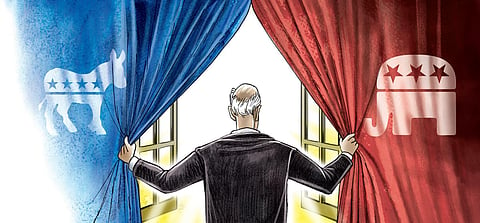

After a bitter campaign followed by a week of uncertainty, the US presidential election is reported to be complete. The vote count in the battleground states indicates that Democratic party candidate Joseph Biden will be the 46th President of the United States. At the time of writing this opinion, President Donald Trump was yet to concede, still placing bets on lawsuits to stall the verdict.
It now appears that many in the Republican party leadership are not favourably disposed to joining the chorus about ‘large-scale fraud’ in the elections. Accusations notwithstanding, the US elections highlighted the need for a review of certain aspects of the electoral process. The declaration of the election results was delayed due to the mail-in ballot mechanisms, which became a highly contentious issue. The large-scale use of mail-in ballots raises a few important questions.
First, do mail-in ballots facilitate free expression and ensure secrecy of vote? A polling booth provides a watertight environment where the vulnerable can express their choice without fear. However, with mail-in ballots, voting may get contaminated by various factors such as the presence of an abusive spouse, an overbearing parent and other family dynamics. Second, can county and state governments define election procedures in a manner that results in delays or contentious national verdicts? States like Florida did usher in reforms to improve the transparency in counting processes after the infamous controversy during the presidential election in 2000.
While the rights of the states to set their election procedures need not be diluted, the need to ensure some standardisation should be recognised. Given the likely prospect of delay in delivery and loss of ballots, the counting processes will be marked by anxieties, which is not good for the health of the polity. The concerns about mail-in ballots should not be dismissed casually, and at the same time, it is important not to taint the whole election process without clear evidence of electoral malpractice/malfeasance.
The election, amidst a pandemic, witnessed an impressive turnout, with over 66% of voters exercising their franchise. While Biden received more than 76 million votes, Trump also got over 71 million votes. Raging pandemic and associated economic challenges do not seem to have dented Trump’s popularity among large sections of the population. The razor-thin margins of victory in various states for Biden and the less-than-satisfactory performance of the Democratic party in the elections for Senate as well as the House of Representatives is indicative of the deep political divide in the US.
However, the fragmentation of political power across the parties may be a blessing in disguise as it might push important stakeholders to adopt more centrist positions. On the other hand, if the ideological extremism in both parties prevails, then the policy-making will resemble low-intensity trench warfare.
By choosing Kamala Harris as his running mate, Biden has demonstrated his commitment to professional competence and celebration of ethnic/racial diversity.
In fact, Kamala Harris will be the first woman to become the US Vice President. Now, Biden will have to demonstrate political sagacity by constituting his team on metrics of ideological diversity and political inclusivity. The architecture of the new cabinet will also have an impact on the US foreign policy. If Biden retains Trade Representative Robert Lighthizer and/or Secretary of State Michael Richard Pompeo, as numerous responses to a tweet by Richard Rossow (India Chair at CSIS) wished for recently, then it would indicate a policy continuity towards China.
In the past year, the Trump administration took a tough stance on Beijing by imposing trade tariffs, and Secretary Pompeo often criticised China’s “virulent strain of communism”. Over the years, the US policy towards China was premised on the notion that China could be socialised to conduct its foreign policy as per international norms and rules through sustained economic engagement. However, the experience has been to the contrary.
It was China that made consistent efforts to socialise the rest of the world to accept its territorial assertions and trade practices. For all his unpredictable policies, it was Trump who initiated a series of coherent policy measures to counter Chinese tactics. Much of Asia will be closely watching President-elect Biden’s appointments to see if there will be a shift in China policy.
On the other hand, during Trump’s presidency, the US relationship with European allies deteriorated significantly on the question of sharing the financial burden of the collective security frameworks. Not surprisingly, there was a sigh of relief in many European capitals with Biden’s victory. Further, his recent statement that Russia constituted the biggest threat to America was received favourably by some European allies.
However, the change in the office of the President is likely to have a significant impact on Washington’s foreign policy towards the Middle East. The Trump administration, in the recent past, played an important role in facilitating the establishment of diplomatic relations between Israel and some Arab countries through a series of accords. These accords, along with the earlier US withdrawal from the Iran nuclear deal and imposition of sanctions on Tehran, tilted the balance of power in the region to Iran’s disadvantage.
The statement by an Iranian diplomat, that “at last the political life of a man [President Trump] who was spreading resentment is over”, suggested there is anticipation in some quarters of Tehran that it may be relatively easy to work with the new administration. Biden will have to walk a very fine line in the Middle East to balance the interests of allies, sustaining the recent progress made and establishing regional peace.
While many big foreign policy decisions await Biden, it is likely that his administration’s energies will be consumed by efforts to “heal America”. Allies in Asia are hoping that the process of restoring the “soul of America” will also translate into a rejection of transactional approaches that focus on immediate gain, especially towards authoritarian countries like China.
Sanjay Pulipaka
Senior Fellow at the Delhi Policy Group
(Views expressed are personal) (sanjay@dpg.org.in)